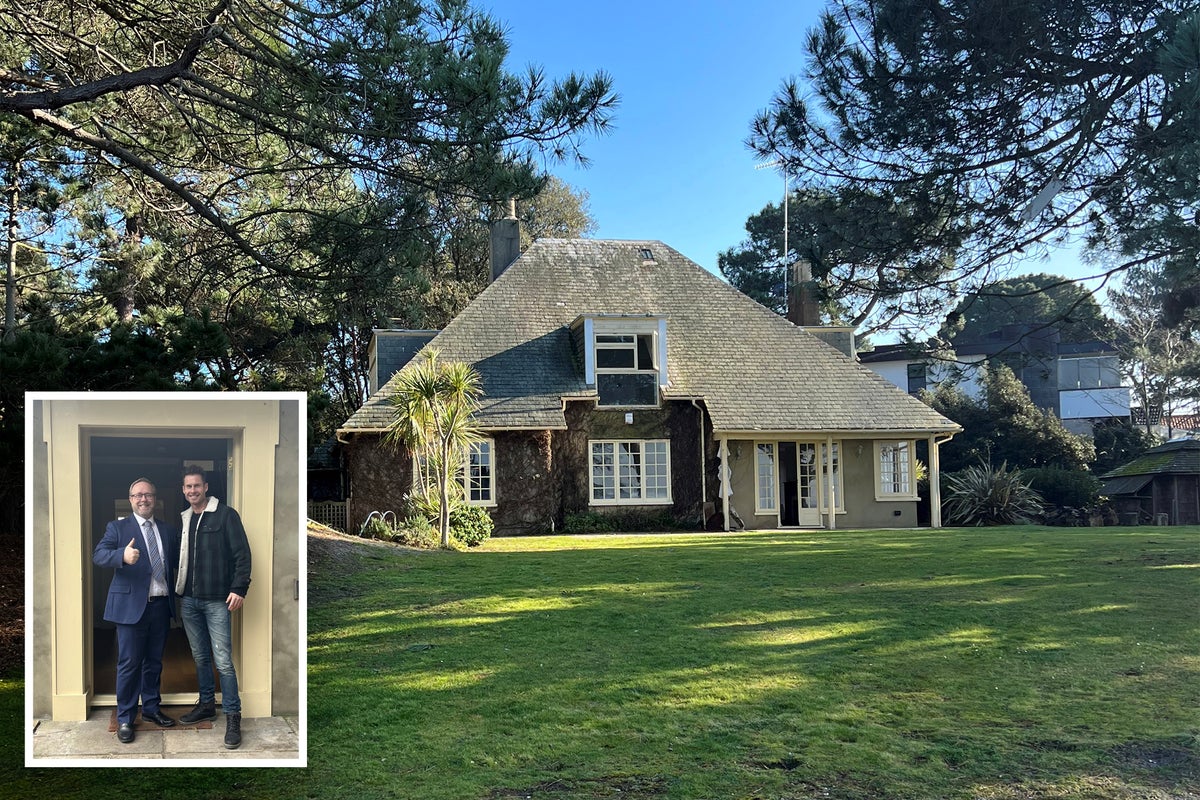
Get the free Morning Headlines email for news from our reporters across the world
Sign up to our free Morning Headlines email
When tycoon recruitment boss Tom Glanfield paid £13.5 million for a run-down cottage on the exclusive Sandbanks neighbourhood in Dorset, the 44-year-old joked “people may thinking I’m mad for paying so much money”.
The entrepreneur proudly unveiled his big plans to tear down the bungalow with a leaking roof and dated decor and replace it with a eco-friendly five-bedroom house complete with a cinema room and gym on the exclusive peninsula.
But roll forward almost a year, and Mr Glanfield ambitious plans on the so-called Millionaires’ Row appear to be in tatters after the local council claimed the Edwardian cottage was a “heritage asset”.
By refusing planning permission, Mr Glanfield looks like he’s been left with the world’s most expensive bungalow with the building costing more, price-per-square foot, than some of the most expensive properties in New York and London.
Tom Glanfield bought the bungalow for £13.5 million with plans to replace it with a new modern home
( SWNS)
In its refusal decision, Bournemouth, Christchurch and Poole Council said demolition of the cottage would cause “significant harm” to the surrounding conversation area, adding the planned home was of “an unsympathetic design”.
The bungalow, known as North Haven Point, is located on a 1.4-acre plot of land with prime views overlooking Poole harbour, and had been owned by the same family for more than a century before the businessman purchased it.
On describing the cottage’s interior as “ugly and outdated” and claiming it did not meet building standards, Mr Glanford unveiled his plan to replace it within months of buying it, stating he planned to spend £10m on the project.
But unlike other large properties appearing along the coastline, he vowed to build a low-rise family home that would not detract anything from the natural beauty of the area along with a new tidal defence wall to protect it.
Tom Glanfield (right) and estate agent Robert Dunford on purchasing the bungalow last year
( SWNS)
The plans showed the master suite with a raised jacuzzi bath with sea views and its own balcony. The downstairs featured an open-plan kitchen with a home office and entertainment bar, while a gym and cinema room featured in the basement.
Back in March last year, Mr Glanfield said: “People may think I’m mad for paying so much money for a house, and potentially knocking it down, but I just fell in love with the position of it.
“We knew the condition of the property before we purchased it. Thankfully, I’m much more comfortable knocking something down that’s in such a poor state. Especially if we can build a true future home.”
However, despite five letters of support for the plan, the council’s conservation officer raised objections with the property having been nominated for inclusion on the local heritage list, giving it the status of a non-designated heritage asset (NDHA).
Mr Glanford’s own archtects accepted the “negative impact” from the loss of the bungalow, but added that the new sea wall with “naturalistic rock” and replacement property “of exceptional design quality” would ofset any damage.
However, the conservation officer, Kalina Kuteva, wrote: “By virtue of its design and palette of materials, the proposed dwelling would jar against the remaining Edwardian villas along Panorama Road and would not respect the character and appearance of the conservation area.
“It is therefore unclear… why the proposed loss of a sympathetic period property to a dwelling of a broadly neo-modern/post-modern, out-of-keeping design is sought to be sold as a benefit.”
In its decision notice, the council wrote: “The proposal by reason of the demolition of the existing cottage would result in the total loss of the non-designated heritage asset causing significant harm to the Sandbanks Conservation Area.
“Consequently, losing a positive building to a single dwelling of an unsympathetic design is not considered a heritage or public benefit which could outweigh the harm to the significance of the conservation area.”
Mr Glanfield started the LHi Group recruitment business in 2002 from his parent’s attic in Exmouth, Devon, using a £9,000 graduate loan. The company now has over 450 staff and offices in London, Manchester, Berlin, Munich, New York, Los Angeles and Austin in Texas.
The Independent has attempted to contact Mr Glanfield for comment.
✕
Subscribe to Independent Premium to bookmark this article
Want to bookmark your favourite articles and stories to read or reference later? Start your Independent Premium subscription today.
SubscribeAlready subscribed? Log in
Popular videos
{{/link}}

